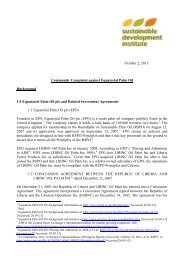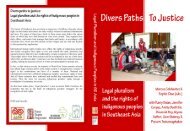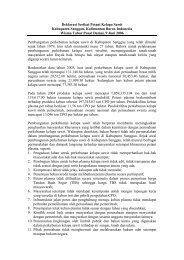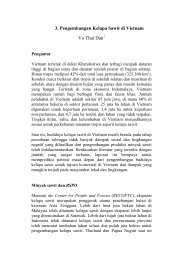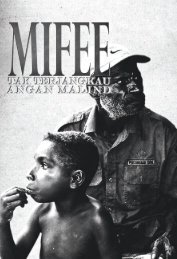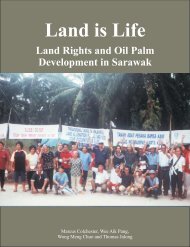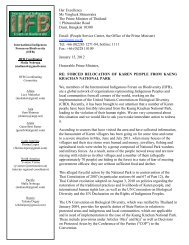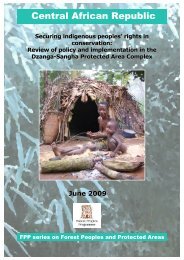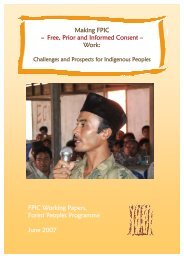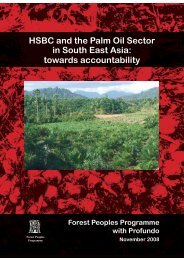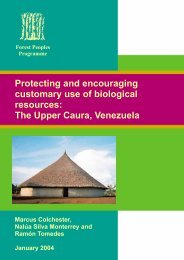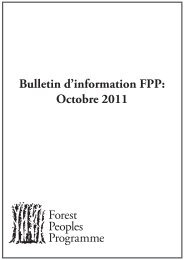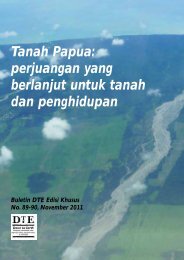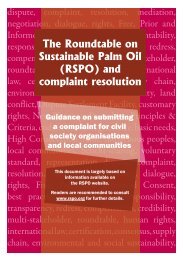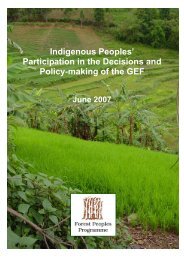Sime Darby oil palm and rubber plantation in Grand Cape Mount ...
Sime Darby oil palm and rubber plantation in Grand Cape Mount ...
Sime Darby oil palm and rubber plantation in Grand Cape Mount ...
You also want an ePaper? Increase the reach of your titles
YUMPU automatically turns print PDFs into web optimized ePapers that Google loves.
<strong>Sime</strong> <strong>Darby</strong> <strong>oil</strong> <strong>palm</strong> <strong>and</strong> <strong>rubber</strong> <strong>plantation</strong> <strong>in</strong> Gr<strong>and</strong> <strong>Cape</strong> <strong>Mount</strong> county, Liberia<br />
Sections 4 <strong>and</strong> 5 provide a full analysis of national <strong>and</strong> <strong>in</strong>ternational law as regards l<strong>and</strong><br />
acquisition <strong>and</strong> the rights of customary communities over l<strong>and</strong> <strong>and</strong> resources. In summary,<br />
although some progress has been made <strong>in</strong> reforms relat<strong>in</strong>g to forests, a lack of reform of l<strong>and</strong><br />
laws <strong>and</strong> the agriculture sector <strong>in</strong> particular, leaves customary communities vulnerable to<br />
‘l<strong>and</strong> grab’ <strong>in</strong> violation of the <strong>in</strong>ternational laws <strong>and</strong> best practice highlighted <strong>in</strong> Section 5. In<br />
its requirement for maximum feasible participation by Liberian citizens <strong>in</strong> the management of<br />
the national economy <strong>and</strong> natural resources, the Constitution provides a national law<br />
foundation for advanc<strong>in</strong>g the right to FPIC. This is complemented by environmental<br />
protection laws, which provide a degree of procedural protection to communities <strong>in</strong> terms of<br />
<strong>in</strong>formation provision <strong>and</strong> consultation.<br />
However, as outl<strong>in</strong>ed above State laws <strong>and</strong> policies <strong>and</strong> their implementation create obstacles<br />
for FPIC, as well as other cross-cutt<strong>in</strong>g rights relat<strong>in</strong>g to l<strong>and</strong> <strong>and</strong> resources. This is primarily<br />
because the government appears to see FPIC as encroach<strong>in</strong>g on government sovereignty, on<br />
their right to establish concession contracts <strong>and</strong> speak for their people. A further problem is<br />
that undeeded customary l<strong>and</strong> is treated as a state asset to be used as it sees fit. As noted<br />
above, the President <strong>in</strong>itially made it very clear to the company that it should not negotiate<br />
directly with the communities to resolve the situation, <strong>and</strong> had made it clear to communities<br />
that they had no right to refuse any company activities which the government had authorised.<br />
However the new M<strong>in</strong>ister of Internal Affairs, Blamoh Nelson, said he recognises that the<br />
government will have to work hard to rega<strong>in</strong> the trust of Liberians <strong>in</strong> general, as well as<br />
communities <strong>in</strong> this particular context:<br />
Previously the government has not worked <strong>in</strong> a way that encourages good<br />
governance. The government is encourag<strong>in</strong>g an aggressive civil society.<br />
‘Government says this, communities say that’ creates a dichotomy. . . . We<br />
fought a civil war so that people would be respected.<br />
In reference to any agreements communities may have entered <strong>in</strong>to with <strong>Sime</strong> <strong>Darby</strong>, he<br />
added: ‘These are sovereign people who are sign<strong>in</strong>g a sovereign agreement.’ There is<br />
therefore hope that the government is mov<strong>in</strong>g away from poor governance practices, <strong>and</strong> will<br />
work towards shap<strong>in</strong>g a new governance <strong>and</strong> rural development paradigm based on a<br />
fundamental respect for community rights over customary l<strong>and</strong>s <strong>and</strong> resources.<br />
8.5. In practice what are the ma<strong>in</strong> obstacles for local communities to secur<strong>in</strong>g their<br />
l<strong>and</strong>s <strong>and</strong> exercis<strong>in</strong>g their right to FPIC<br />
The pr<strong>in</strong>cipal obstacles for secur<strong>in</strong>g community l<strong>and</strong> rights their right to FPIC stem from<br />
problems <strong>in</strong> the exist<strong>in</strong>g l<strong>and</strong> law coupled with poor practices of government <strong>and</strong> <strong>in</strong>vestor<br />
companies such as <strong>Sime</strong> <strong>Darby</strong> <strong>in</strong> concession allocation, management <strong>and</strong> oversight. As a<br />
result, there is a failure to implement <strong>and</strong> ensure compliance with <strong>in</strong>ternational law <strong>and</strong> best<br />
practice. Customary communities are not recognised as hav<strong>in</strong>g the right to FPIC because they<br />
are not seen as own<strong>in</strong>g their l<strong>and</strong>. The government perception exemplified by the <strong>Sime</strong> <strong>Darby</strong><br />
case is that all l<strong>and</strong> that is not deeded is state l<strong>and</strong>. This perception does not recognise preexist<strong>in</strong>g<br />
customary rights over that l<strong>and</strong> <strong>and</strong> resources <strong>and</strong> the right to FPIC. The government<br />
therefore believes it has the right to dispense with these undeeded l<strong>and</strong>s <strong>and</strong> resources as they<br />
wish. <strong>Sime</strong> <strong>Darby</strong> has acted <strong>in</strong> a way that accepts this status quo.<br />
24



